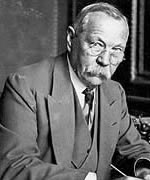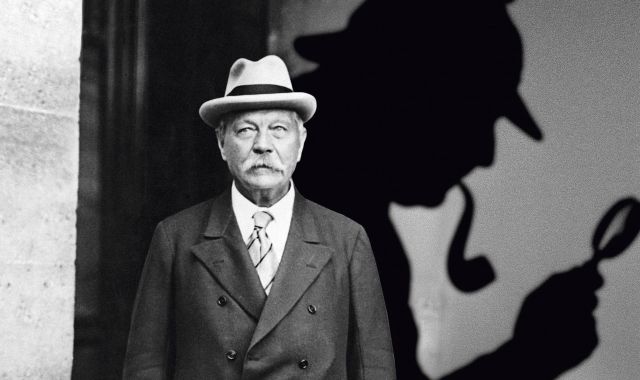Arthur Ignatius Conan Doyle
 |
| Arthur Ignatius |
Nació el 22 de mayo de 1859 en Edimburgo (Escocia), y murió el 7 de julio de 1930. Sus géneros literarios fueron la novela y los detectives.
Fue médico, novelista y escritor de novelas policiales, creador del inolvidable maestro detective Sherlock Holmes.
Conan Doyle nació el 22 de mayo de 1859 en Edimburgo y estudió en las universidades de Stonyhurst y Edimburgo, en esta última estudió medicina desde 1876 hasta 1881. En junio de 1882 se trasladó a Portsmouth. Mientras estaba allí, instaló una clínica. Al principio no le fue muy bien con ella, por lo que en su tiempo libre volvió a empezar a escribir cuentos.
Tuvo tanto éxito al comienzo de su carrera literaria que en cinco años abandonó la práctica de la medicina y se dedicó por completo a la escritura.
Su primer trabajo notable fue "Un estudio en escarlata", donde el escritor crea el detective de ficción más famoso, Sherlock Holmes, que se publicó en 1887. El autor confió en un profesor que conoció en la universidad para crear el personaje de Holmes con su ingenioso capacidad de razonamiento deductivo. Igualmente excepcionales son las creaciones de los personajes que lo acompañan: su amigo afable y torpe, el Dr. Watson, que es el narrador, y el archicriminal profesor Moriarty.
Las mejores historias de Holmes son El signo de los cuatro (1890), Las aventuras de Sherlock Holmes (1892), El sabueso de Baskerville (1902) y Su último saludo escénico (1917), gracias al cual se hizo mundialmente famoso. y popularizó el género de la novela policíaca. El culto al detective Holmes surgió y aún sobrevive.
Gracias a su versatilidad literaria, Conan Doyle tuvo el mismo éxito con sus novelas históricas, como Micah Clarke (1888), The White Company (1890), Rodney Stone (1896) y Sir Nigel (1906), así como con su obra de teatro History. de Waterloo (1894).
Durante la Guerra de los Bóers fue médico militar y a su regreso a Inglaterra escribió The Boer War (1900) y The War in South Africa (1902), justificando la participación de su país. Por estas obras se le concedió el título de señor en 1902.
Durante la Primera Guerra Mundial, escribió La campaña británica en Francia y Flandes (6 volúmenes, 1916-1920) en homenaje a la valentía británica. La muerte en la guerra de su hijo mayor se convirtió en un defensor del espiritismo, dedicándose a dar conferencias y escribir extensamente sobre el tema. Su autobiografía, Memories and Adventures, se publicó en 1924.
Murió el 7 de julio de 1930 a los 71 años de un infarto, en Crowborough (Inglaterra). Una estatua de él está en ese pueblo donde vivió durante 23 años.
Sus obras mas destacadas:
- El Archivo de Sherlock Holmes
- El mundo perdido
- El Regreso de Sherlock Holmes
- El Sabueso de los Baskerville
- El valle del Terror
- La zona ponzoñosa
- Sir Nigel
- Su última reverencia
English
Arthur Ignatius Conan Doyle
 |
| Arthur Ignatius |
He was born on May 22, 1859 in Edinburgh (Scotland), and died on July 7, 1930. His literary genres were novels and detectives.
He was a doctor, novelist and writer of detective novels, creator of the unforgettable master detective Sherlock Holmes.
Conan Doyle was born on May 22, 1859 in Edinburgh and studied at the universities of Stonyhurst and Edinburgh, in the latter he studied medicine from 1876 to 1881. In June 1882, he moved to Portsmouth. While there, he set up a clinic. At first he did not do very well with her, so in his spare time he began writing stories again.
He was so successful at the beginning of his literary career that within five years he abandoned the practice of medicine and devoted himself entirely to writing.
His first notable work was "A Study in Scarlet", where the writer creates the most famous fictional detective, Sherlock Holmes, which was published in 1887. The author relied on a professor he met in college to create the character of Holmes with his ingenious ability for deductive reasoning. Equally exceptional are the creations of his accompanying characters: his good-natured and clumsy friend, Dr. Watson, who is the storyteller, and the arch-criminal Professor Moriarty.
Holmes's best stories are The Sign of the Four (1890), The Adventures of Sherlock Holmes (1892), The Hound of Baskerville (1902) and his last stage salute (1917), thanks to which he became world famous. and popularized the detective novel genre. The cult of Detective Holmes emerged, and still survives.

Holmes's best stories are The Sign of the Four (1890), The Adventures of Sherlock Holmes (1892), The Hound of Baskerville (1902) and his last stage salute (1917), thanks to which he became world famous and popularized the detective novel genre. The cult of Detective Holmes emerged, and still survives.
Thanks to his literary versatility, Conan Doyle was equally successful with his historical novels, such as Micah Clarke (1888), The White Company (1890), Rodney Stone (1896) and Sir Nigel (1906), as well as with his play History of Waterloo (1894).
During the Boer War he was a military doctor and upon his return to England he wrote The Boer War (1900) and The War in South Africa (1902), justifying the participation of his country. For these works he was awarded the title of sir in 1902.
During World War I he wrote The British Campaign in France and Flanders (6 volumes, 1916-1920) in homage to British bravery. The death in the war of his eldest son made him a defender of spiritism, dedicating himself to lecturing and writing extensively on the subject. His autobiography, Memories and Adventures, was published in 1924.
He died on July 7, 1930 aged 71 from a heart attack, in Crowborough (England). A statue of him is in that town where he lived for 23 years.
His most outstanding works:
- The Sherlock Holmes Archive
- The lost World
- The Return of Sherlock Holmes
- The baskerville's hound
- Valley of Terror
- The poisonous zone
- Sir Nigel
- His last bow



No hay comentarios:
Publicar un comentario